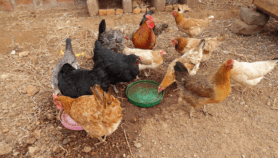Send to a friend
The details you provide on this page will not be used to send unsolicited email, and will not be sold to a 3rd party. See privacy policy.
Periodic outbreaks of Ebola virus have devastated communities in parts of Africa, with mortality rates of up to 90 per cent. Contact with infected wild animals including primates — and the consumption of their meat — have been identified as a source of outbreaks. But scientists still don't know where the virus originated.
In this article John Vidal describes research into the origins of the virus and into reducing its impact on human health. Scientists are investigating birds, bats and rodents — each potentially capable of carrying the virus without themselves being infected — in their search for Ebola's host. Promising vaccines are also in development, but have yet to be tested on humans.
Another puzzle is why the disease can disappear for years before breaking out again. Researchers are assessing whether climate and vegetation have a role. And they are investigating differences between human populations — and their diets — to see whether they influence the timing and location of Ebola outbreaks.













